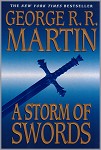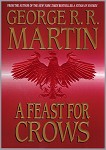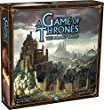The Seven |
| Friday, 18 July 2008 22:13 | |
|
Tags:religion-Westeros-Faith of the Seven-The Faith-The Father-The Mother-The Warrior-The Maiden-The Smith-The Crone-The Stranger-Seven Pointed Star-Warriors Sons-Poor Fellows-Faith Militant-Great Sept of Baelor-Starry Sept The two most prominent religions of Westeros are the old gods of the First Men who have been supplanted everywhere but in the North, and the ubiquitous religion of the Andals, known as the Faith of the Seven — the new gods. The new gods represent the primary religion of Westeros, brought over by the Andals from the eastern continent. The seven faces of the gods consist of the Father, the Mother, the Warrior, the Crone, the Smith, the Maid, and the Stranger. Followers of the Seven normally only pray to six of the faces of god. Few if any ever pray to or sing about the Stranger, for he or she is the face of death. The Faith teaches that the Seven are simply different aspects of one god. The Father, also known as the Father Above, is depicted as bearded and sometimes crowned. He has a judicial role in the pantheon, called upon to aid in judgement. The Father is also asked to judge the dead fairly during funeral services. The Mother, who is similarly known as the Mother Above, is a smiling protector of children, mothers, and innocents. She is prayed to when a woman finds herself with child. During wedding ceremonies of the Faith, the septon stands between the depictions of the Mother and the Father. The Warrior, patron of battles and soldiers, is portrayed wielding a sword. Faithful worshipers of the new gods will beseech him for victory in war or courage in battle. The wizened Crone is the face of fate, often seen carrying a lantern. It is said that she let the first raven into the world when she peered through the door of death. Worshipers implore her to grant them wisdom. Rendered with a hammer in hand, the Smith is the guardian of all things manufactured. He also fixes things that are broken, and as such is considered a god of healing and a protector of the crippled. Prayers to him seek strength for arms and armour, or good fortune when launching a new ship. The Maid is the beautiful benefactor of young women, girls, and lovers; she is prayed to when any of these need looking after. Her courage is often sought as a blessing for young girls to help them navigate the dangers of growing up in the world. The Stranger is the face of duality, seen as male and female or neither, and as human and not (some idols have half-animal faces). The Stranger is a wanderer in the far places, seen as the face of death. The Stranger is also the dark guide who leads the newly dead to the other world, and judges whether a soul is punished and sent to the seven hells, or rewarded. Prayers to the Seven can also invoke other aspects of the gods, or seek aid from them in unusual quarters. A woman may pray to the Mother in order to protect her children in wartime. A man with a twisted sense of humour may light a candle to the Stranger when he is about to face his own demise. ClergyPriests in the Faith of the Seven are known as the godsworn: septons if male, septas if female. Septons and septas follow a system of vows, and receive clerical training at various institutions of the Faith. They tend to be literate and learned, and are dedicated to all seven aspects of the new gods. Septas may have just as much responsibility or authority as septons, due in part because their religion is split evenly amongst three male and three female aspects (plus the sexless aspect of the Stranger). There are other orders of the Faith with less formal training and education. These godsworn are brothers or sisters, often dedicated to a particular aspect of the Seven. For example, a septry dedicated to the Smith would have working brothers who tend farms, make wine and ales, and so forth. Other godsworn choose to wander the land as begging brothers. Clad in undyed brown robes, they beg for alms and grant blessings to the faithful. They roam the roads of Westeros and preach. They are normally uneducated, but may have learned many prayers by rote. Finally there are the silent sisters, an order dedicated to the Stranger. They are sworn to silence and chastity, and prepare men for the grave. They clothe themselves in grey and veil their face but for their eyes — it is ill fortune to look upon the face of death. The Faith once had a military arm, two orders of brothers sworn to the Warrior: the Warriors Sons, a knightly order comprised of the noble classes, and the Poor Fellows, drawn from the common folk. They are known as the "Swords" and "Stars" respectively and were brutally suppressed by King Maegor the Cruel. Only recently have they reconstituted. Temples to the new gods are referred to as septs, while monasteries are called septries. The most common symbols of the seven faces of the gods are seven-faced crystals or sevenpointed stars. In fact, most septs contain a giant crystal prism that splits the light into rainbows, and crystals are left on the graves of the faithful. Rural septs are adorned with humble furnishings, such as carved masks or simple charcoal drawings on walls, while in wealthy septs, statutes inlaid with precious metals and stones can often be found. The highest-ranking official in the Church of the Seven is the High Septon — a figure of papal authority — beneath whom are the Most Devout, a council of as yet undetermined size. The High Septon abandons his birth name upon taking office and presides over the faithful from the High Sept of Baelor in King’s Landing. From the top of the High Sept are seven towers, each of which contains a bell. These bells are rung only on momentous occasions. Before the advent of the Targaryens, the seat of the Faith was the ornate Starry Sept in Oldtown, constructed in black marble with stained glass windows set in pointed arches. PracticesThe Faith has a great many moral teachings. It frowns on gambling, preaches against bastardy, and curses things like incest and kinslaying. One of the central holy texts of the Faith is The Seven-Pointed Star, which is divided into gospel-like sections, such as The Maiden's Book, also called The Book of the Maiden. Each of the Seven has his or her own book. During trials by combat, the Seven are expected to intervene on the side of the just combatant. In order to become a knight, a squire must spend a nightlong vigil in a sept and become anointed in the name of the Seven. For this reason, there are few knights in areas where the Faith is not kept, such as the North. The number seven is considered holy to the Faith. It holds that there are seven hells as well as seven faces. Seven constellations in the sky are considered as sacred, and even grace is taught to have seven aspects. The number seven is used to imbue rituals or objects with a holy significance. In the naming of a child, seven oils are used to anoint the infant. Worshipers of the Seven light candles before altars symbolizing each of the seven aspects. Ceremonies are lead by the highest ranking male member of the clergy, and hymns are often sung to gain the blessings of the Seven. Rites of worship held in rich areas and during special occasions can feature embellishments such as choirs of seventy-seven septas. HymnsFor mercy during war: Gentle Mother, font of mercy,
|
|
| Last Updated on Saturday, 22 January 2011 00:29 |






















